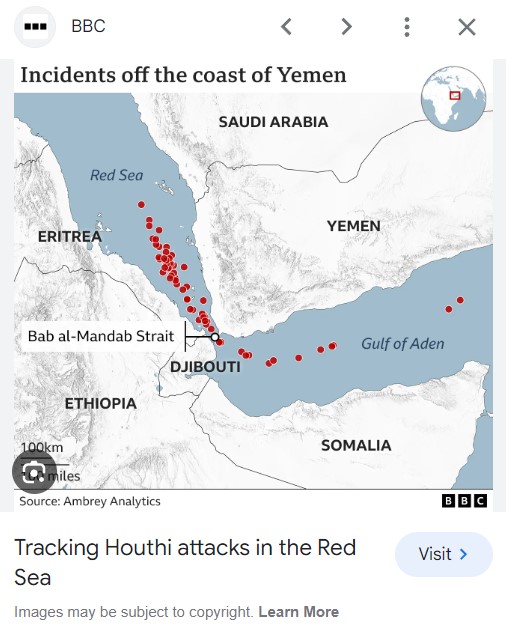This is mainly belated comentary on “How a Ragtag Militia in Yemen Became a Nimble U.S. Foe” I think there are lessons to be learned from the success of the Houthi militia in Yemen. The lesson I learn is the lesson I claim to have learned again and again — most US defence spending is wasted, because a huge amount is spent on expensive platforms rather than on smart munitions launched from lots of cheap platforms (drones and missiles *again*). First, I think it is useful to look back a bit at the recent (and horrible) past. There is now mostly near peace in Yemen after years of bloody war pitting the Houthi militia against the internationally recognised Yemeni government and, more importantly, Saudi Arabia and the United Arab Emirates.
Topics:
Robert Waldmann considers the following as important: Uncategorized
This could be interesting, too:
tom writes The Ukraine war and Europe’s deepening march of folly
Stavros Mavroudeas writes CfP of Marxist Macroeconomic Modelling workgroup – 18th WAPE Forum, Istanbul August 6-8, 2025
Lars Pålsson Syll writes The pretence-of-knowledge syndrome
Dean Baker writes Crypto and Donald Trump’s strategic baseball card reserve
This is mainly belated comentary on “How a Ragtag Militia in Yemen Became a Nimble U.S. Foe”
I think there are lessons to be learned from the success of the Houthi militia in Yemen. The lesson I learn is the lesson I claim to have learned again and again — most US defence spending is wasted, because a huge amount is spent on expensive platforms rather than on smart munitions launched from lots of cheap platforms (drones and missiles *again*).
First, I think it is useful to look back a bit at the recent (and horrible) past. There is now mostly near peace in Yemen after years of bloody war pitting the Houthi militia against the internationally recognised Yemeni government and, more importantly, Saudi Arabia and the United Arab Emirates. This war ended with an informal and uneasy cease fire under which the Houthi militia controlled a large area of Nothern Yemen. Notably, the Houthi militia does not have an airforce and Saudia Arabia does have an airforce. I conclude that (traditional piloted) air power isn’t what it used to be back in the 20th century. Other evidence comes from Ukraine where Ukraine has an airforce which is tiny compared to the Russian airforce. Interestingly, I never read about this fact when military success in Ukraine is discussed. I also note that, in Afghanistan, the victorious Taleban had no airforce while the USA has a rather large airforce. I’d say there appears to be a pattern here. I’d also say that piloted aircraft are flying off into the sunset buzzing horse cavalry and catapults, as I have written here (search for obsolete), here, here, and here .
In contrast, the Houthis mainly rely on rockets, drones, and missiles launched basically from pickup trucks
“But the two U.S. officials cautioned on Saturday that even after hitting more than 60 missile and drone targets with more than 150 precision-guided munitions, the strikes had damaged or destroyed only about 20 to 30 percent of the Houthis’ offensive capability, much of which is mounted on mobile platforms and can be readily moved or hidden.
Did anyone ever write anything about smart munitions mounted on a lot of cheap platforms ?
Also (in one of those posts I think) I wrote that the useful weapons against lots of mobile missile launchers are drones not piloted aircraft and look
“So far the Pentagon strategy has been to put armed Reaper drones and other surveillance platforms in the skies over Yemen, so that U.S. warplanes and ships can hit Houthi mobile targets as they pop up.”
I love to say “I told you so” but I told you so.

